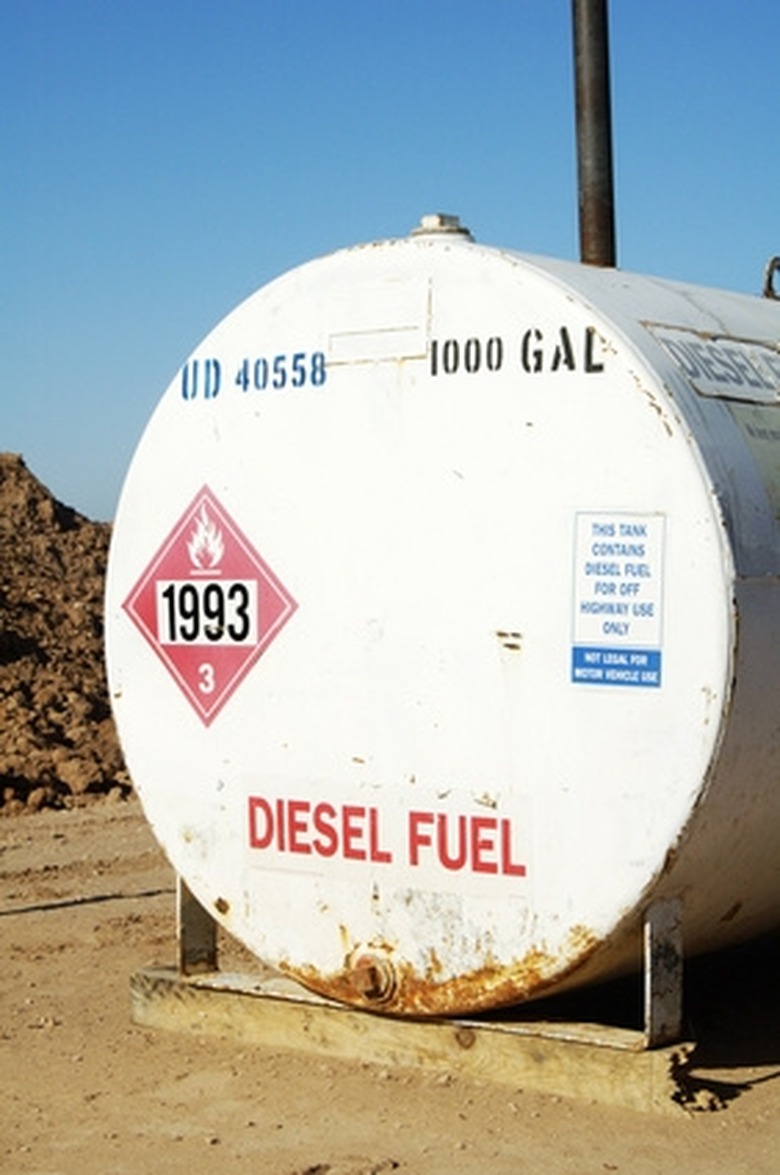What Is Diesel Fuel?
Diesel is known most commonly as the fuel for trucks, boats, buses, trains, machinery and other vehicles. Diesel, like gasoline, is made from crude oil. However, diesel and other fuels made from crude oil are different in several ways.
Identification
Identification
Diesel is denser than gasoline. It is oilier and has a different odor than gasoline. At fueling stations, diesel pumps are clearly marked. Diesel fuel containers must be colored yellow, whereas gasoline comes in a red container. On a similar note, kerosene comes in a blue container. On a molecular level, gasoline and diesel are different. The chemical composition for gasoline is typically C9H20 whereas diesel is often C14H30. These are just a few ways diesel is distinct from other crude oil fuels.
Distillation
Distillation
Diesel is a fossil fuel, meaning it is distilled from crude oil, or petroleum. Petroleum is mined from deep within the earth and, according to a 2005 article in Organic Chemistry written by Keith A. Kvenvolden, is composed of ancient biomass (the organic remains of plants and animals) that has been subjected to high heat and pressure. Diesel is created through a process called "fractional distillation," which separates certain parts of the crude oil.
Function
Function
Diesel engines function through internal combustion. The intake valve of the engine opens and brings air into the cylinder. Next, the piston compresses the air by moving upward. At this point, fuel is injected. The air, which has become heated through the compression, ignites the fuel, forcing the piston back down. The piston then moves up to the top of the cylinder again, releasing the exhaust from the combustion. Because of this four-step process, the diesel engine is said to have a "four-stroke combustion cycle."
Differences
Differences
A gasoline engine functions in much the same way as a diesel engine. However, a gas engine mixes air and fuel before it is injected into the cylinder. The mixture is then ignited by a spark plug. Diesel engines, on the other hand, don't have spark plugs. The fuel is ignited by compressed air.
Considerations
Considerations
In some ways, diesel is better for the environment than gasoline. Diesel fuel contains fewer additives than gasoline and thus releases less greenhouse gases. However, diesel does produce more sulfur when burned, which contributes to acid rain.
Biodiesel
Biodiesel
Recent developments in alternative fuel sources has yielded biodiesel. Biodiesel is not a fossil fuel. It is derived from vegetable oil. Biodiesel burns cleaner than traditional diesel fuel. Some biodiesel can be mixed with petrodiesel and be used in normal diesel engines. However, because biodiesel tends to dissolve dirt and other matter in fuel lines, fuel filters can quickly become clogged and should be changed often. Biodiesel is identified as B20 (a 20 percent biodiesel mixture) and B100 (pure biodiesel).
Cite This Article
MLA
Busch, Jack. "What Is Diesel Fuel?" sciencing.com, https://www.sciencing.com/diesel-fuel-4672724/. 24 April 2017.
APA
Busch, Jack. (2017, April 24). What Is Diesel Fuel?. sciencing.com. Retrieved from https://www.sciencing.com/diesel-fuel-4672724/
Chicago
Busch, Jack. What Is Diesel Fuel? last modified August 30, 2022. https://www.sciencing.com/diesel-fuel-4672724/
